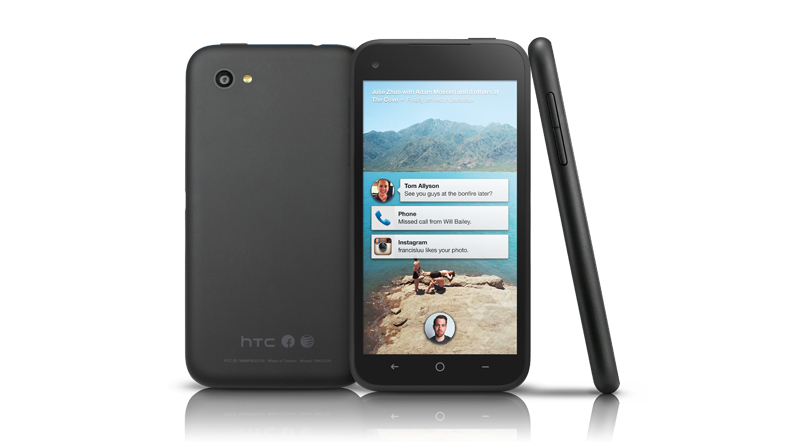TechRadar Verdict
The HTC First is a good phone, but not for any of the reasons being highlighted in its marketing. It's compact, durable and has great LTE service from AT&T. Sans Facebook Home, it's exactly the type of device we wish we'd see more often.
Pros
- +
Finally, a 4.3-inch LTE-capable stock Android phone
- +
Solid, durable construction with a good screen
- +
There's stock Jelly Bean under Facebook Home
- +
Chat Heads are fun and functional
Cons
- -
Facebook Home is a glorified screensaver
- -
Below average camera
- -
Variable battery performance
- -
No removable storage or battery
- -
The Facebook phone needs a dedicated camera button
Why you can trust TechRadar
Update: AT&T has dropped the price of the HTC First. With two-year contract, the phone is now just $0.99 cents.
Call Facebook ubiquitous and you're understating your case. Unlock any random smartphone and you're guaranteed to find a little blue F icon waiting on the home screen.
Facebook is so big, so everywhere, so omnipresent that it's already on everyone's phone, but apparently that's not enough for the sharing mogul. Now Facebook has decided to completely take over devices with Facebook Home, and has collaborated with HTC to create the HTC First, a phone meant to show just what that experience can be.
The First moniker comes from being the first phone with Facebook Home preloaded. It's a well built, unassuming little handset, nowhere near as big, flashy or as fast as the quad-core HTC One.
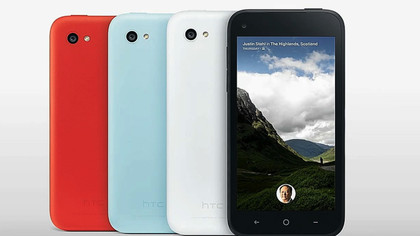
It's so subdued, you could almost mistake it for an iPhone 5 secured in a rubber case. It's a 4.3-inch dual-core handset that's currently exclusive to AT&T's 4G LTE network, going for $0.99 with two-year agreement. It comes in black, red, white, pale blue or red, and will cost you $350 at full price.
Once you dive into the software, however, the First resembles nothing else. Thanks to the Facebook Home overlay, it takes some digging to realize the HTC First is running Android 4.1: Jelly Bean with no manufacturer or carrier tweaking.
There's actually an excellent stock Android experience to be had here, one with solid battery life thanks to a small screen and restrained dual-core processor. There's also fast data service, provided by LTE coverage from AT&T. That's something you can't get on the other best stock Android experience in town, the Nexus 4.
Sign up for breaking news, reviews, opinion, top tech deals, and more.
This comes once you've disabled Facebook Home, however. With it enabled, all the basic smartphone functionality is there, it's just been buried by layer upon layer of whatever stuff your Facebook friends are posting. Posts are there right from the lock screen, using friends' cover photos as backgrounds.
Even SMS text messaging, that old standby of the smartphone, has gotten all Facebooked. On the HTC First it's been baked into the social network's own Messenger app, and displayed with floating Chat Heads icons.
So does total Facebook integration add or detract from the Android experience, or is it a whole different beast altogether? Is this a natural evolution, or has the premier service for liking cat videos and posting pics of meals growing cold finally gotten too big for it's britches? Read on for our take.
Design
Physically, the HTC First has a very manageable design. It's just 5-inches tall, like an iPhone 5. That makes it perfect for users who find large handsets, such as the Galaxy S3 and the upcoming Galaxy S4, too big.
It nestles nicely in the palm, and has a rubberized body with rounded corners like the HTC 8X. Unlike aluminum bodied phones such as the HTC One and the iPhone 5, it won't scuff easily, and doesn't need a case to prevent unsightly scratches.
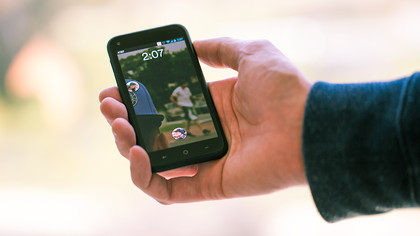
At 4.37 ounces, it's a very balanced weight. There's enough there to be substantial, but it's light enough to toss in a pocket or purse and forget about.
HTC phones, even cheaper ones, usually have nice screens, and the First is no exception. The display is 4.3-inches and with a resolution of 1280 x 720, we're in 720p HD territory.
As is also the case with HTC phones, the color saturation is well tuned. Colors are true to life, and videos and pictures look quite good. You'd have to hold the First next to the best screens around, the HTC One, iPhone 5 or Galaxy S3, to realize it's less than premium.
Continuing with the HTC traditions, the First has a sealed body design. There's no opening it up to remove the battery or add storage, but this also gives it a very solid build quality. It doesn't feel like a phone that costs a lot of money, but it doesn't feel as cheap as, say, the HTC One VX, either.
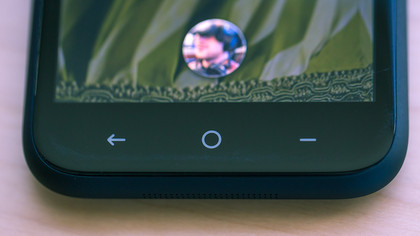
Below the screen you'll find three capacitive buttons that light up when the First is active. Other than their looks, this is typical Android stuff. The back button is an arrow pointing left, home is a circle and the option button is a line or dash.
These symbols don't correspond to any Facebook features that we're aware of, so we're not sure why HTC stepped away from the typical Android design language. Maybe just to give the first Facebook phone a unique look?
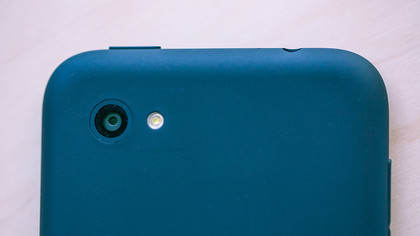
On the back things get normal again. There you'll also find the lens for a 5-megapixel camera and an LED flash.
The First is also surprisingly restrained when it comes to branding. For the device meant to introduce the world to Facebook Home, it only has one little F logo on the back, next to HTC and AT&T's marks. We applaud everyone's restraint here.
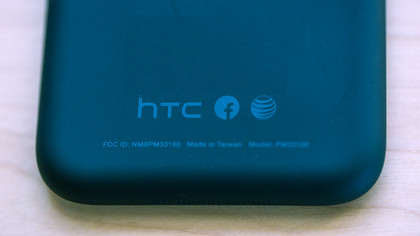
On the right there's a SIM card tray, which pops out when the included SIM tool or a paper clip is inserted. Above that is the standard mini USB charging port, which struck us as odd placement. It'll only be annoying if you frequently use your phone while it's charging.
Usually the charging port is found on the bottom, below the screen, but instead that's where the First's speaker grill resides. This is the only speaker on the phone, and we sometimes had to take care not muffle it when watching videos, so it's not optimal placement.
On the upper left side you'll find a run-of-the-mill volume rocker. It's easy enough to find and press without looking at your phone.
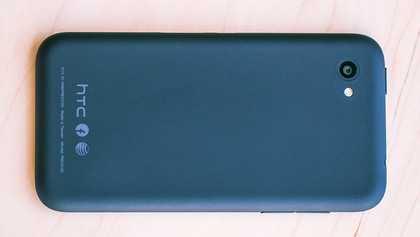
At the top you'll find a headphone jack and lock button. As with the iPhone 5, it's easy to reach the lock button since the phone is just 5-inches. Tall handsets with hard to reach lock buttons on the top, like the HTC One, tend to annoy us.
One thing that strikes us as missing is a dedicated camera button. If there's actually someone out there who would like a phone built around Facebook, they would surely be obsessed with picture taking and Instagram. The lack of quick shutter snapping access is a major design fail.
Overall though, the HTC First is pleasant, if unremarkable to hold. The functional but milquetoast design of this phone, as well as the fact that Facebook Home buries the best Android functionality, reveals the sort of audience the First is chasing. This phone is for someone who wants to forget about their phone when they're not using it, and only wants to do basic things like text, share pictures and check Facebook when they are using it.
Furthermore, the immense pleasure we felt at having a Jelly Bean phone of a reigned in size speaks to oversaturation of too-large handsets in the Android market. Won't someone please make a reasonably sized quad-core LTE phone and let it run stock Android? Help us, Google Nexus 5, you're our only hope!
